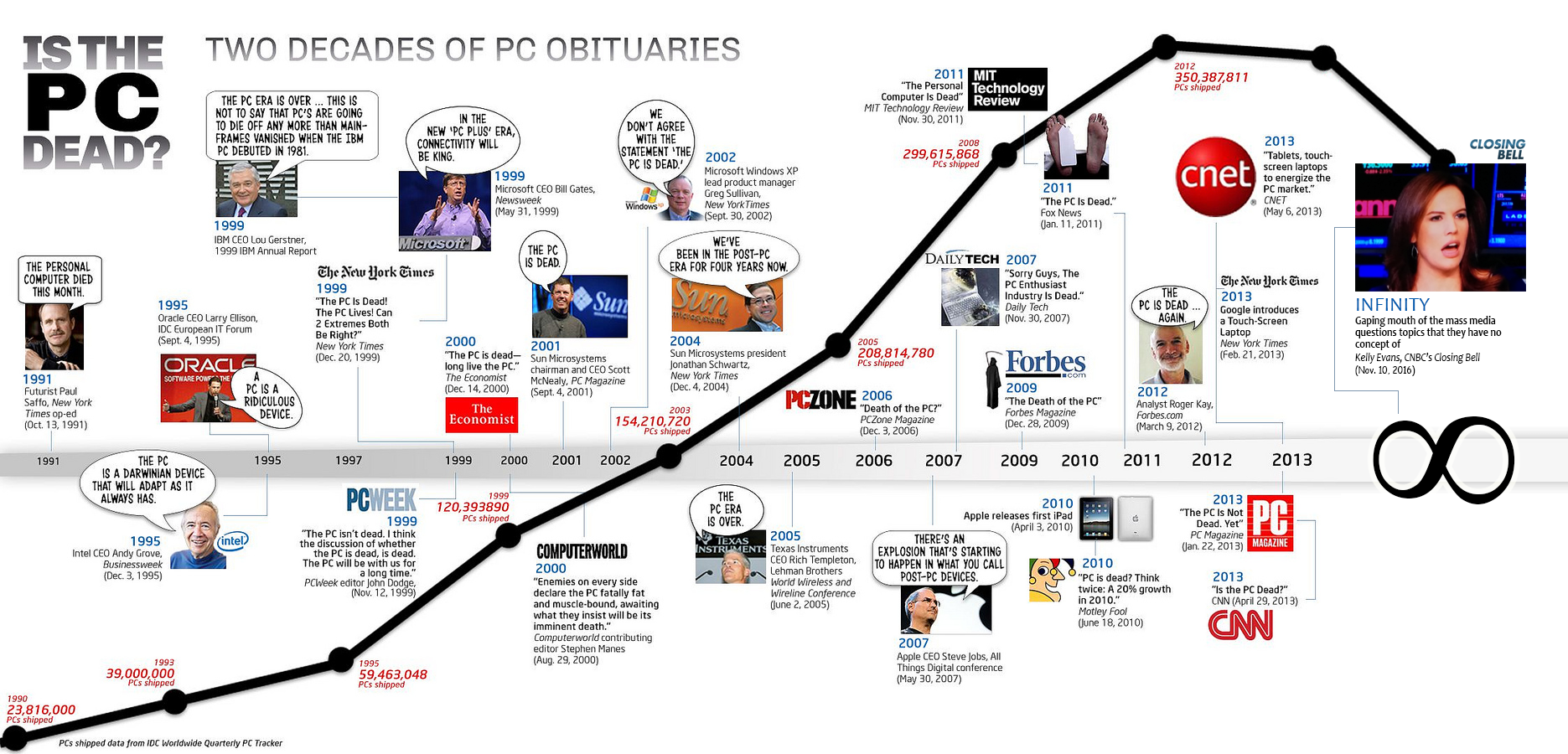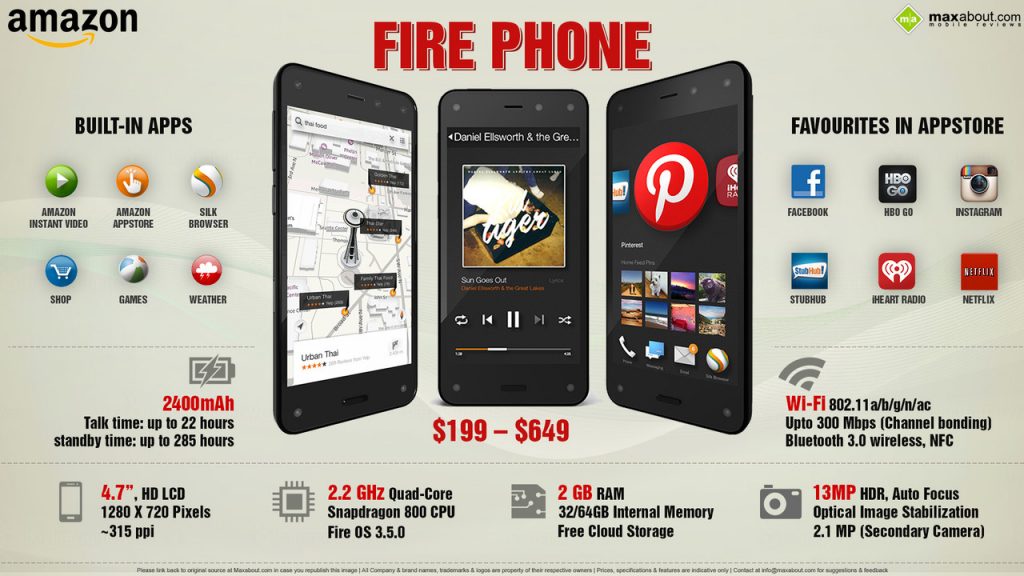The Chief Editor Said The PC is Dead, But She Wrote Fresh Articles Using a PC.
What an oxymoronic behavior exhibited by the fictional editor. The PC is dead she exclaimed thrice, but proceeded to be productive on the equipment she just lambasted. If one searches for the PC is dead on Google, it will provide various spins of the title. However, is the PC really dead? Let’s dive in deeper in order to demystify the myth of pundits who jump on the band wagon and write without substantive data. The PC is dead craze must have started as a result of a company launching a new product. In order to garner attention, they came up with “The PC is dead” campaign. For example, you may remember back in 2008, when Samsung released its instinct model phone and promoted it as “the iPhone Killer.” In 2010 Facebook’s founder told the world email is dead, in favor of its messaging service to rival Google’s Gmail. Back in 2014, Facebook’s co-founder Dustin Moskovitz also said email is dead, in order to favor and promote his new company Asana. It’s a common strategy in the product tech world to target a service or something big, and say it’s dead in order to draw attention to your product or service. That’s cool, we shouldn’t have a problem with that, it is a promotional tactic.
However, we should take issue with pundits on T.V. or other experts who make the masses believe the notion that the PC is folding up. The quality of the pudding is always in the taste; hence refuting the doubters with empirical data should put the matter to rest. Gartner says, “worldwide combined shipments of devices (PCs, tablets, ultramobiles and mobile phones) are projected to reach 2.5 billion units in 2014, a 7.6 percent increase from 2013.”
This article was written about a year before its published date. Since it’s 2020, please scroll down to review data from 2017.
Yes, PCs numbers may have declined briefly, but it’s not being decimated. Even if it were, what does one replace the PC with, I would like to know.
Worldwide Device Shipments by Segment (Thousands of Units)

Source: Gartner (December 2013) www.gartner.com/newsroom/id/2645115
My analysis percentage decrease for PC (Desk-Based and Notebook)
12 months duration >> 2012-2013 2013-2014 2014-2015
Percentage decline >> 12% 7.2% 3.2%
Reduction in Global Units Shipped
- 2012 to 2013 there was a reduction of 41,931,000 million units
- 2013 to 2014 projected reduction of 21,403,000 million units
- 2014 to 2015 projected reduction of 9,448,000 million units
As we can see, in just one year from 2013-2014 the rate of percentage decline drops rapidly from 12% to 7.2% close to half. From 2014 to 2015 the rate drops from 7.2% to 3.2% which is less than half. If we were to extrapolate using Gartner numbers; we could easily surmise that in three years, although the total global units of PCs shipped would reduce, the precipitous decline would have flattened out. If we base our analysis on Gartner’s projections, we can see clearly that PCs are not dead. Albeit, we do not have the criteria and ingredients that went into how Gartner arrived at the numbers. We can assume it’s solid because they are industry leaders and that’s all we have. There’s an interesting fact I am curious about. Did Gartner factor in the global population growth, more important the growing affluence of the middle class around the world, which will necessitate its use, thus increasing PC growth as advanced economies currently have. Although the growth rate of mobile devices in the emerging markets far outweighs developed economies, that’s because of the factors below
- Higher populations
- Mobile devices and phones are cheaper than PCs
- Advanced economies are already saturated, sluggish growth
Reasons Mobile is Increasing Globally
1. New form factor of tablets
2. The cool factor
3. Easier to carry about (mobility factor)
4. Cheaper price (one tenth of the price of a PC).
5. First timer buys in India, Egypt, Kenya, Tunisia and more countries are buying a cell phone first.
6. Households may have 1 PC, but each adult usually has one, or two mobile devices.

Reasons Computers will Retain Their Utility
- Corporations: thousands of computers in corporations around the world will never be usurped by phones or tablets.
- Computing power of cell phone is not powerful enough to perform on handle heavy duty applications
- Size: you cannot do hardcore work e.g., motion graphic processing on a small screen
- Schools and Universities administrators need to use PCs
The Grey Area is Microsoft’s New Surface Pro 3
Mobility products from Apple, i.e. iPads and Samsung’s tablets are great. However, the introduction of MS surface 3 pro which blends a tablet and laptop together is an interesting concept. Contingent on computing power; I see this taking shape as an interesting form factor. It enables mobility due to its detachable tablet. Heavy duty work could be done once both pieces clasp together to form a laptop. If I were to put on my technology futurist hat, I would stake a bold claim that if anything would kill the PC, this is it. It may not be this exact Microsoft version, perhaps a version from its rivals, but this new form factor might be the winner.
Preliminary Worldwide PC Vendor Shipment Estimates for Q1,17 Thousands of Units

Source: Gartner (April 2017) Notes: Data includes desk-based PCs, notebook PCs and ultramobile premiums (such as Microsoft Surface), but not Chromebooks or iPads. All data is estimated based on a preliminary study. Final estimates will be subject to change. The statistics are based on shipments selling into channels. Numbers may not add up to totals shown due to rounding.
Conclusion
Some people need both for different reasons; phones for mobility, fun, messaging including all that’s in between, and desktop for stationary heavy duty work.


